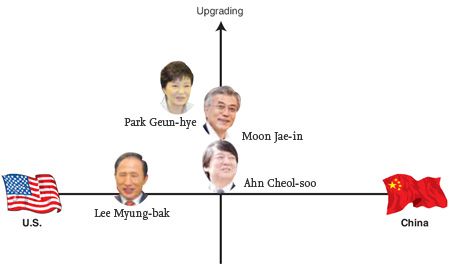All 3 candidates vow closer ties with China
The next president will face a tough foreign policy landscape featuring the U.S.-China rivalry in East Asia and intensified territorial disputes between China and Japan.
The three major presidential candidates echoed that boosting relations with China will be a key policy task for the next president as Seoul-Beijing ties are being put to the test because both sides are not on the same page over North Korea.
They do, however, differ on how to handle the challenge.
Aides of Rep. Park Geun-hye, presidential candidate of the ruling Saenuri Party, say she would beef up Seoul-Beijing ties over security and political cooperation if elected, while making a significant effort to deepen the Korea-U.S. alliance.
The foreign policy visions of Rep. Moon Jae-in of the main opposition Democratic United Party (DUP) and independent candidate Ahn Cheol-soo are almost identical. They have both pledged to put an emphasis on “striking a balance in Korea’s relations between the United States and China,” the latter being the South’s No. 1 trade partner.
Yun Byung-se, a senior foreign policy advisor to Park, told The Korea Times that Seoul-Beijing relations are not commensurate with a strategic partner.
“China has been our strategic partner since 2008 (as the two sides agreed to upgrade bilateral relations). So far, Seoul-Beijing ties couldn’t have been better in terms of trade,” he said.
“But when we look at political and security issues, we can see that bilateral ties are not as robust as that of strategic partners. An ally (referring to the United States) and a partner (China), however, are different. The Park camp will address the difference when mapping out policies toward the two countries.”
Yun, also former senior presidential secretary on foreign policy and national security to the late former President Roh Moo-hyun, observed there is a key difference between Park’s foreign policy visions and those of Moon or Ahn.
The Moon and Ahn camps appear to seek equidistant diplomacy toward Washington and Beijing, while paying little attention to the different characteristics of an ally and a partner, he said.
Kim Kyung-soo, a campaign staffer handling foreign policy in Moon’s camp, said if Moon is elected, he will try to balance Korea-U.S. alliance and Korea-China relations.
Kim predicted that the worst-case scenario for Seoul would be a confrontation between what he called “the southern security partnership” referring to cooperation among Washington, Seoul and Tokyo and its northern counterpart among Beijing, Moscow and Pyongyang.
“Preventing such a Cold War-like standoff between the two blocs in East Asia will be a key task for the next president,” he said.
Advent of neo Cold War?
His remarks were based on the popular criticism that President Lee Myung-bak put too much emphasis on strengthening the alliance with the United States while neglecting to build solid ties with China. Several opposition politicians alleged that Lee’s “misguided” foreign policy will lead to the advent of a neo Cold War in East Asia.
Yun disagreed with this. He said a U.S.-China rivalry in East Asia won’t lead South Korea to make a choice between Washington and Beijing to “do business.”
The next president will begin the job at Cheong Wa Dae amid a global power shift. Territorial disputes over the Senkaku or Diaoyu Islands between China and Japan have never been more severe than now since World War II. The United States’ plan to have a stronger presence in East Asia complicates the geopolitics of the region.
Washington has encouraged South Korea and Japan to sign a trilateral military cooperation pact with the United States to better thwart provocative North Korea and to stabilize East Asia. The trilateral partnership left China leery of the motives as some analysts claim that the United States aims to encircle the rising power. Washington has denied this.
Yun noted that the defense partnership didn’t aim to counter China.
The Ahn camp has suggested balanced and multilateral diplomacy as South Korea’s foreign policy posture at a time of a global power shift.
“In particular, striking a balance between South Korea’s diplomacy toward the United States and that of China is important,” Ahn said in his book, “Ahn Cheol-soo’s Thoughts.”
“The Korea-U.S. alliance is important and therefore both sides need to make efforts to keep it going smoothly. At the same time I believe we need to manage our relations with the United States and China well to make sure that neither side dominates our foreign policy.”
In the Ahn camp, no one was available for comment on the foreign policy vision of the software millionaire-turned-politician, although they announced the lineup of his foreign policy team, headed by Yoon Young-kwan, former foreign minister to the late President Roh.
Lee Sook-hyun, public relations staffer for Ahn, said the independent candidate will unveil his roadmap for major policy areas, including foreign policy, on Sunday. <The Korea Times/Kang Hyun-kyung>

























































